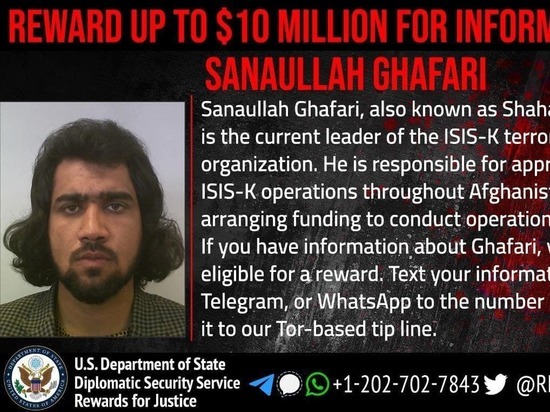The United States on February 7 offered a US$10-million reward for information leading to the "identification or location" of Sanaullah Ghaffari, the leader of the Islamic State-Khorasan (IS-K), which is the Afghanistan regional chapter of the Islamic State of Iraq and the Levant (ISIL) terror group, which originated in Iraq and Syria. .
The reward offered by the US State Department reportedly was also for any information that would aid in arresting or convicting those responsible for the "terrorist attack at the Kabul airport" on August 26, which was claimed by the IS-K.
The attack, which killed more than 100 people including 13 American soldiers, was launched as the United States orchestrated its chaotic withdrawal from Afghanistan and the evacuation of Afghans deemed under threat by the Taliban's takeover.
According to Washington, Sanaullah Ghaffari – also known as Shahab al-Muhajir – was appointed head of IS-K in June 2020 by the Islamic State terror group.
"Ghaffari is responsible for approving all IS-K operations throughout Afghanistan and arranging funding to conduct operations," the State Department said in a statement.
He had been blacklisted in November as a foreign terrorist.
AFP says little is known about Ghaffari, although his nom de guerre suggests he arrived in the region from the Arab world.
He is rumored to have been an Al-Qaeda commander or a former member of the Haqqani network, one of the most powerful and feared factions in the Taliban.
Meanwhile, Hindustan News Hub says that according to the United State, Sanaullah Ghaffari was born in 1994 in Afghanistan.
ISIL described Ghaffari as a veteran military leader and one of ISIL’s urban lions in Kabul. This dreaded terrorist has been involved in many guerrilla terrorist operations besides plotting suicide attacks.
IS-K was reportedly established in 2015. In this organization ‘Khorasan’ is actually a province of Afghanistan which covers most of Afghanistan, Iran and Central Asia.
IS-K has been responsible for some of the deadliest attacks in the region in recent years, massacring civilians in Afghanistan and Pakistan, at mosques, shrines, public squares and hospitals. The group has especially targeted Muslims from sects it considers heretical, including Shiites – much like the original IS group.




